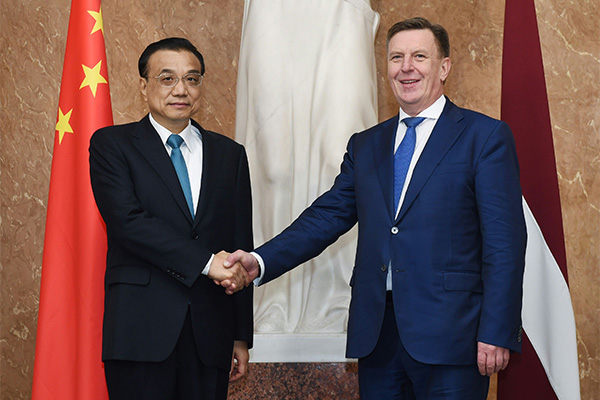
Premier Li Keqiang meets with Latvian Prime Minister Maris Kucinskis on Nov 4 local time in the country’s capital Riga.[Photo provided to chinadaily.com.cn]
Premier Li Keqiang vowed on Nov 4 to strengthen cooperation with Latvia in infrastructure and production capacity and showed willingness to participate in railway and port projects in the Baltic Sea area.
Latvia is a crucial partner for China in Central and Eastern Europe and under the framework of European Union, Premier Li said when meeting with Latvian Prime Minister Maris Kucinskis in the country’s capital Riga.
Premier Li is on his first visit to Latvia, where he is also scheduled to attend the 5th Meeting of Heads of Government of China and Central and Eastern European countries, which kicks off on Nov 5.
For the past 25 years since the establishment of diplomatic ties, both countries have consolidated political trust, deepened pragmatic cooperation in various fields, and nursed increasing people-to-people exchanges, Premier Li said.
China has cost-effective equipment and rich experience in building railways and ports, and is willing to participate in Europe’s infrastructure projects such as Rail Baltica, a trans-European railway linking Riga and Berlin, and the construction of ports and a logistics park under the framework of a three-sea harbor district cooperation initiative, Premier Li added.
The initiative refers to cooperation programs concerning the Adristic Sea, the Black Sea and the Baltic Sea. It was proposed by Premier Li in last year’s China-CEE countries meeting in Suzhou, Jiangsu province.
Premier Li said China is willing to strengthen other pragmatic cooperation with Latvia, which will be taken as an important transit point for China-EU trade.
Kucinskis said Latvia will cultivate a stable environment for Chinese enterprises and strive to become a portal for Chinese enterprises to enter the market of Central and Eastern European countries.